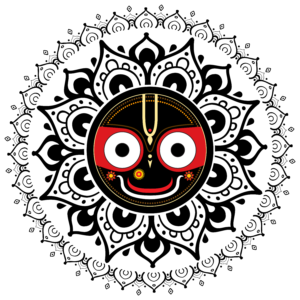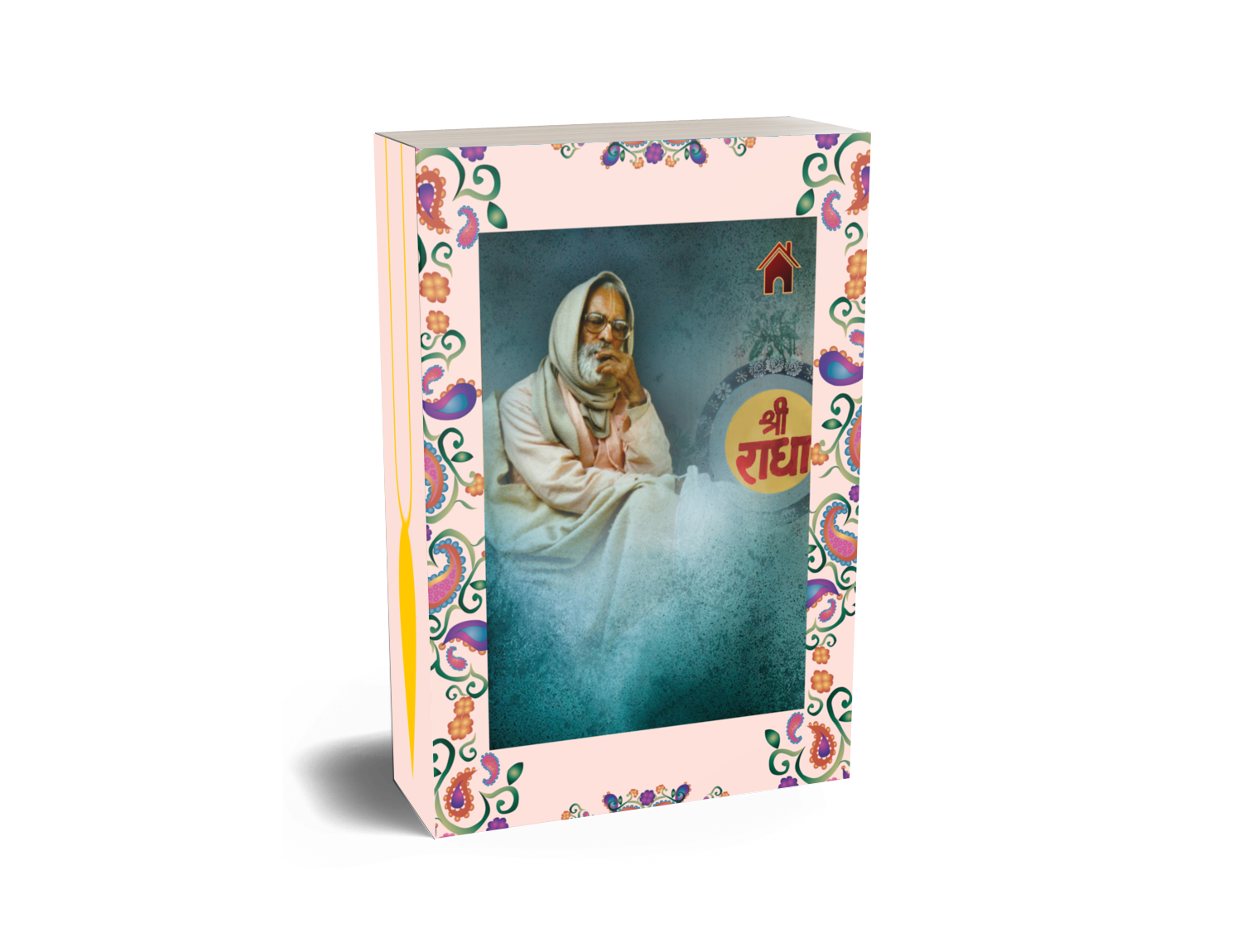

Chapter Nine from the book, Bhakti-rasāyana, 4th edition by Śrīla Bhaktivedānta Nārāyaṇa Mahārāja
Superior to the Pulinda girl we have been discussing are the sakhās, and of them Śukadeva Gosvāmī says:
yadi dūraṁ gataḥ kṛṣṇo
vana-śobhekṣaṇāya tam
ahaṁ pūrvam ahaṁ pūrvam
iti saṁspṛśya remire
Śrīmad-Bhāgavatam (10.12.6); Bṛhad-bhāgavatāmṛta (2.7.120)
During the day, while playing and jumping about with His sakhās, if Kṛṣṇa, desiring to see the splendour of the 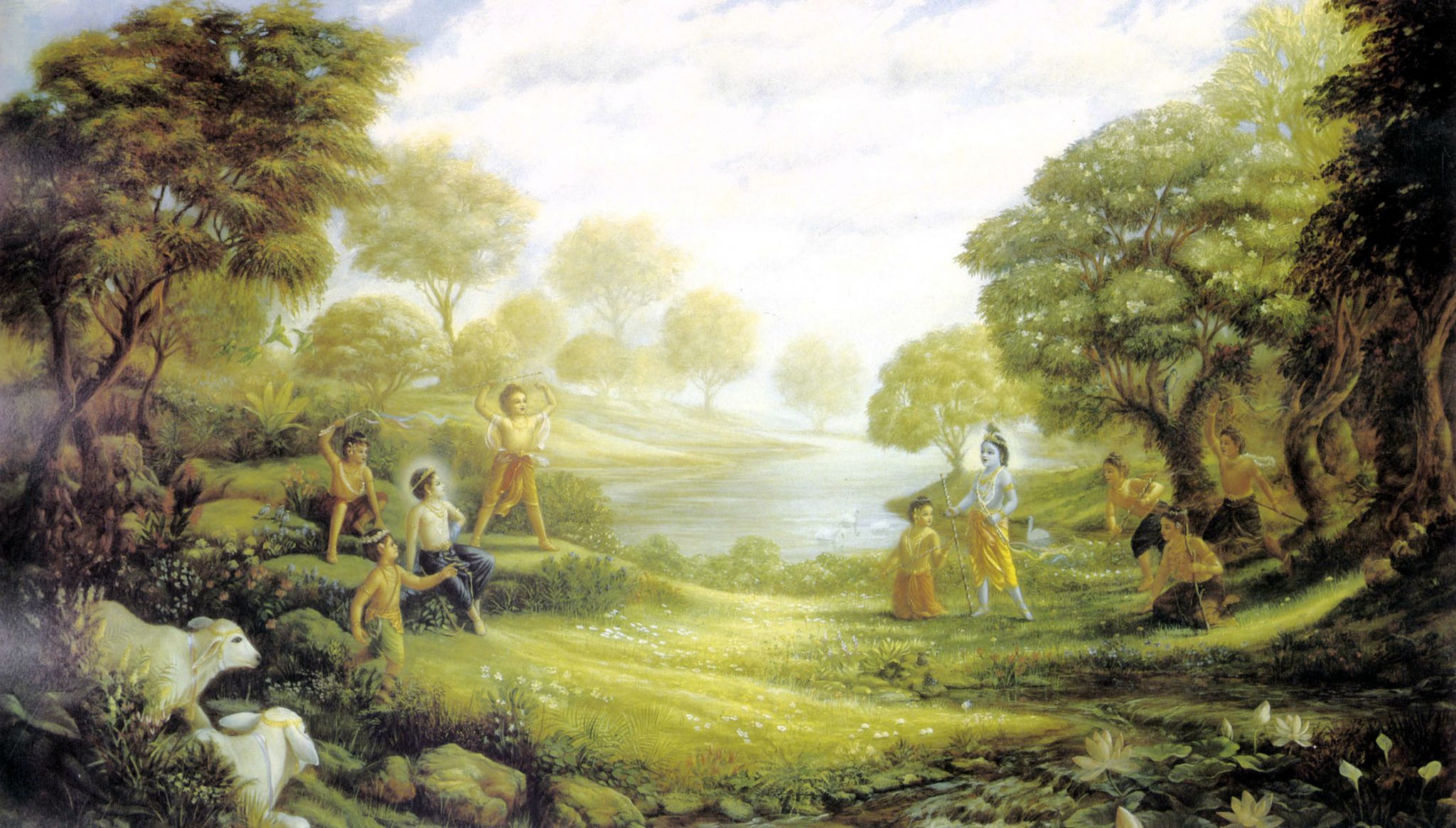 forest, would go to a somewhat distant place, then with great speed the sakhās would run to Him saying, “I will touch Him first! I will touch Him first!” and in this way they enjoyed life. They would embrace Kṛṣṇa, and Kṛṣṇa would also embrace them. They would refer to one another as “Sakhā, Sakhā!” and they would carry one another on their shoulders. Because they would play with Kṛṣṇa in such an unrestricted fashion, both indoors and outside, these young gopas are superior to the Pulinda girl.
forest, would go to a somewhat distant place, then with great speed the sakhās would run to Him saying, “I will touch Him first! I will touch Him first!” and in this way they enjoyed life. They would embrace Kṛṣṇa, and Kṛṣṇa would also embrace them. They would refer to one another as “Sakhā, Sakhā!” and they would carry one another on their shoulders. Because they would play with Kṛṣṇa in such an unrestricted fashion, both indoors and outside, these young gopas are superior to the Pulinda girl.
In the early morning Kṛṣṇa would still be sleeping, and Subala, Madhumaṅgala and others would come and jump 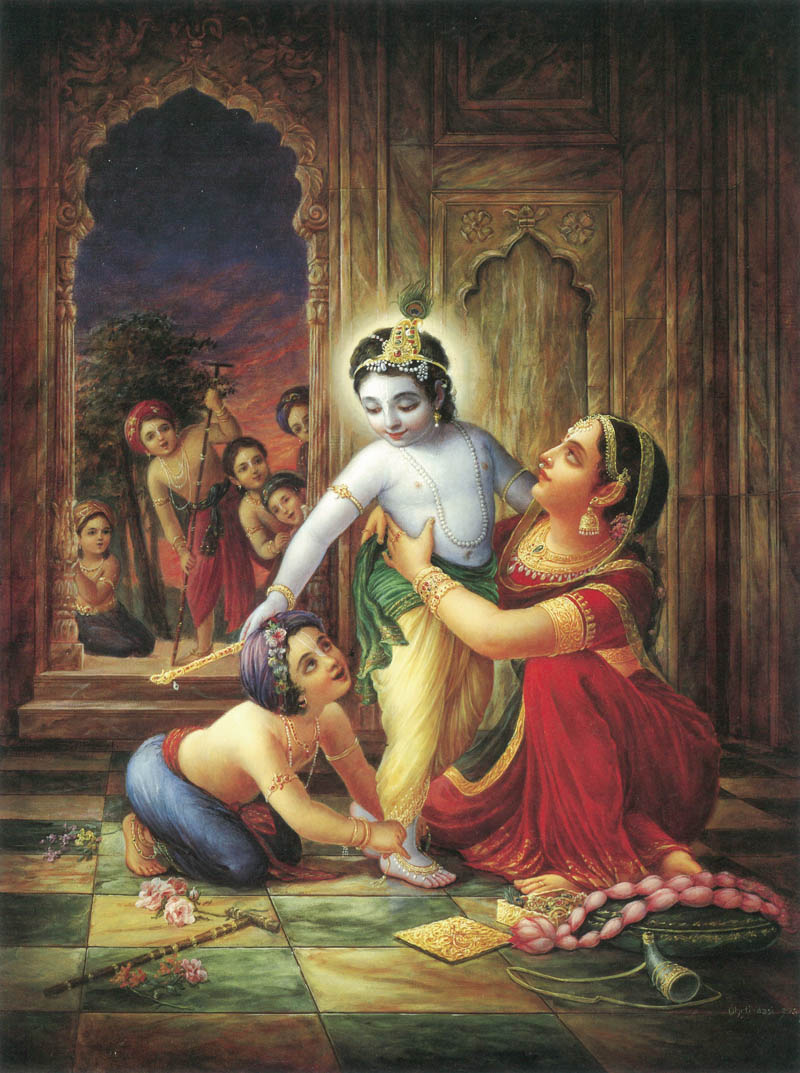 on His bed to awaken Him. Mother Yaśodā would be hesitant to awaken Him, because generally a sleeping child should not be awakened. If He slept too late, then to awaken Him perhaps she would sing a sweet song and gently sprinkle some water on His face. But the sakhās would simply jump on Him, and then they would accompany Him to the forest for the day. While eating and drinking, while inside the house or outside, coming and going, they would always accompany Kṛṣṇa. Seeing this, the gopīs say, “These sakhās are so fortunate! Day and night, anywhere and everywhere, they are always playing with Kṛṣṇa. If we could become sakhās, then we would always feel great happiness! We could always be by His side. Sometimes Mother Yaśodā feeds them at the same time she feeds Kṛṣṇa, and then they play together all day long. In this way they are always fully satisfied.”
on His bed to awaken Him. Mother Yaśodā would be hesitant to awaken Him, because generally a sleeping child should not be awakened. If He slept too late, then to awaken Him perhaps she would sing a sweet song and gently sprinkle some water on His face. But the sakhās would simply jump on Him, and then they would accompany Him to the forest for the day. While eating and drinking, while inside the house or outside, coming and going, they would always accompany Kṛṣṇa. Seeing this, the gopīs say, “These sakhās are so fortunate! Day and night, anywhere and everywhere, they are always playing with Kṛṣṇa. If we could become sakhās, then we would always feel great happiness! We could always be by His side. Sometimes Mother Yaśodā feeds them at the same time she feeds Kṛṣṇa, and then they play together all day long. In this way they are always fully satisfied.”
Singing the glories of the youthful cowherds, the gopīs became absorbed in bhāva. This is the nature of prema,  and especially the nature of mahābhāva. Recognising even a trace of prema in others, the gopīs consider them to be more fulfilled than they themselves. When Śrī Caitanya Mahāprabhu was in Purī surrounded by His devotees, a dog approached Him. It was making a whining sound, and tears began to fall from its eyes. Mahāprabhu was eating coconut and gave that dog some of His prasāda, and when the next day the dog was nowhere to be found, everyone understood that it went to Vaikuṇṭha. So who wouldn’t desire to become that dog and be able to approach Mahāprabhu and receive some of His prasāda? Then rolling on the ground in ecstasy, relinquishing his material body and becoming an eternal associate of Bhagavān in Vaikuṇṭha – who wouldn’t desire such a benediction? Especially those who have prema would desire it. Similarly, upon seeing someone receiving the kindness and affection of Kṛṣṇa – whether they are qualified for it or not – Rādhikā becomes intoxicated and thinks, “They are more fortunate than Me; I wish that My fortune could become like theirs.”
and especially the nature of mahābhāva. Recognising even a trace of prema in others, the gopīs consider them to be more fulfilled than they themselves. When Śrī Caitanya Mahāprabhu was in Purī surrounded by His devotees, a dog approached Him. It was making a whining sound, and tears began to fall from its eyes. Mahāprabhu was eating coconut and gave that dog some of His prasāda, and when the next day the dog was nowhere to be found, everyone understood that it went to Vaikuṇṭha. So who wouldn’t desire to become that dog and be able to approach Mahāprabhu and receive some of His prasāda? Then rolling on the ground in ecstasy, relinquishing his material body and becoming an eternal associate of Bhagavān in Vaikuṇṭha – who wouldn’t desire such a benediction? Especially those who have prema would desire it. Similarly, upon seeing someone receiving the kindness and affection of Kṛṣṇa – whether they are qualified for it or not – Rādhikā becomes intoxicated and thinks, “They are more fortunate than Me; I wish that My fortune could become like theirs.”
Accompanied by countless sakhās, Kṛṣṇa takes the calves out to graze for the day. When calves become a little  bigger they give up drinking the cows’ milk, and Kṛṣṇa takes something like 900,000 of these calves out to graze. Meanwhile Śrīdāmā comes, and how many calves does he have? All of his calves join the procession. Then Madhumaṅgala, Subala, Stokakṛṣṇa, Arjuna and countless other sakhās with countless calves join them. Amongst this procession there are different parties, like when a kīrtana procession is going along. One party holds a banner with the words “Keśavajī Gauḍīya Maṭha”, another holds a banner with the name “Rūpa-Sanātana Gauḍīya Maṭha”, and another party holds a banner displaying the name of another temple. Similarly, the sakhās are going along together, but in separate parties. Sometimes those who desire to separate during the course of the day do so, but at the end of the afternoon when Kṛṣṇa plays the particular melody on His flute that signifies it is time to return, they again come together. Then upon returning, they again go their separate ways when each sakhā takes his calves and goes to his own father’s house.
bigger they give up drinking the cows’ milk, and Kṛṣṇa takes something like 900,000 of these calves out to graze. Meanwhile Śrīdāmā comes, and how many calves does he have? All of his calves join the procession. Then Madhumaṅgala, Subala, Stokakṛṣṇa, Arjuna and countless other sakhās with countless calves join them. Amongst this procession there are different parties, like when a kīrtana procession is going along. One party holds a banner with the words “Keśavajī Gauḍīya Maṭha”, another holds a banner with the name “Rūpa-Sanātana Gauḍīya Maṭha”, and another party holds a banner displaying the name of another temple. Similarly, the sakhās are going along together, but in separate parties. Sometimes those who desire to separate during the course of the day do so, but at the end of the afternoon when Kṛṣṇa plays the particular melody on His flute that signifies it is time to return, they again come together. Then upon returning, they again go their separate ways when each sakhā takes his calves and goes to his own father’s house.
While going along together with their millions of calves, the sakhās play their flutes and horns, sing and play  various games. In this verse it says remire, a derivative of the word ramanā, which means to enjoy. Enjoying with His friends, Kṛṣṇa enters the forest, where they decorate each other with the many varieties of flowers and leaves as well as peacock feathers. At once Kṛṣṇa is decorated like the king of dancers, and He also decorates the other boys. Then they begin playing; how does it start? Śrīdāmā steals one of Madhumaṅgala’s beloved laḍḍus and gives it to another boy, and it is passed around so many times that no one knows where it has gone. Madhumaṅgala approaches everyone asking them, “Have you seen my laḍḍu?” and if they have it, they keep it hidden. One gopa steals another’s flute, horn or stick, and when the owner of it pursues him, he throws it away and then another gopa picks it up and runs with it. In this way they play in their attractive childhood pastimes (bāla-līlā).
various games. In this verse it says remire, a derivative of the word ramanā, which means to enjoy. Enjoying with His friends, Kṛṣṇa enters the forest, where they decorate each other with the many varieties of flowers and leaves as well as peacock feathers. At once Kṛṣṇa is decorated like the king of dancers, and He also decorates the other boys. Then they begin playing; how does it start? Śrīdāmā steals one of Madhumaṅgala’s beloved laḍḍus and gives it to another boy, and it is passed around so many times that no one knows where it has gone. Madhumaṅgala approaches everyone asking them, “Have you seen my laḍḍu?” and if they have it, they keep it hidden. One gopa steals another’s flute, horn or stick, and when the owner of it pursues him, he throws it away and then another gopa picks it up and runs with it. In this way they play in their attractive childhood pastimes (bāla-līlā).
The boys are all laughing and Kṛṣṇa smiles, but if Kṛṣṇa doesn’t smile, then everything is spoiled. Everything is going on exclusively for Kṛṣṇa’s pleasure. At that time, these children have forgotten their homes, families and even their own bodily needs – everything. One boy is playing the flute, another is singing like a bird, another is mimicking a monkey and another is imitating the sound of a frog. For the purpose of increasing their eagerness, sometimes Kṛṣṇa hides, and then the sakhās are unable to stay where they are and they begin searching for Him. If one of them catches a glimpse of Him, then at once they all race there. One after the other they embrace Kṛṣṇa, and laughing, Kṛṣṇa embraces them in return.
When Kṛṣṇa would sometimes go to a slightly distant place to see the splendour of the forest, the sakhās, upon 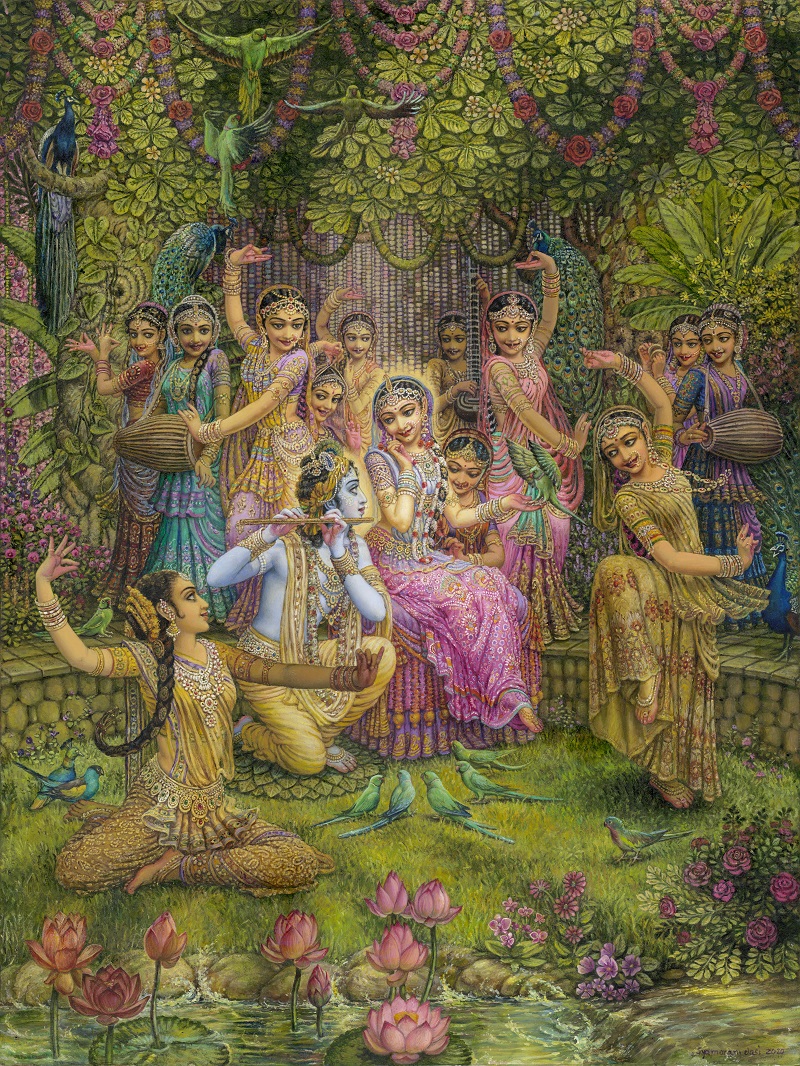 losing the great ecstasy (paramānanda) they experience by playing with Him, become very unhappy. Sanātana Gosvāmī says in his commentary that Kṛṣṇa plays with the sakhās for nine hours each day while taking the cows and calves out to graze. So when do the gopīs receive the opportunity to be with Him for that long? At that time, by the arrangement of Yogamāyā, Kṛṣṇa assumes two forms. In one form He remains playing with the gopas, and in the other form He enjoys with the gopīs at Kusuma-sarovara or Rādhā-kuṇḍa. Or on some pretext He tells the sakhās, “I am going to Kusuma-sarovara to get a drink of water,” and by the influence of Yogamāyā He seems to return in one second only. The gopas don’t know how much time has elapsed, just as an entire night of Brahmā elapsed while the rāsa dance was being performed. During the rāsa-līlā, did any of the members of Kṛṣṇa’s or the gopīs’ households know of it? They considered that it was only an ordinary night lasting eight hours. So either by assuming two forms or remaining in only one form, Kṛṣṇa would sometimes also enjoy with the gopīs during the day.
losing the great ecstasy (paramānanda) they experience by playing with Him, become very unhappy. Sanātana Gosvāmī says in his commentary that Kṛṣṇa plays with the sakhās for nine hours each day while taking the cows and calves out to graze. So when do the gopīs receive the opportunity to be with Him for that long? At that time, by the arrangement of Yogamāyā, Kṛṣṇa assumes two forms. In one form He remains playing with the gopas, and in the other form He enjoys with the gopīs at Kusuma-sarovara or Rādhā-kuṇḍa. Or on some pretext He tells the sakhās, “I am going to Kusuma-sarovara to get a drink of water,” and by the influence of Yogamāyā He seems to return in one second only. The gopas don’t know how much time has elapsed, just as an entire night of Brahmā elapsed while the rāsa dance was being performed. During the rāsa-līlā, did any of the members of Kṛṣṇa’s or the gopīs’ households know of it? They considered that it was only an ordinary night lasting eight hours. So either by assuming two forms or remaining in only one form, Kṛṣṇa would sometimes also enjoy with the gopīs during the day.
Next comes this verse:
itthaṁ satāṁ brahma-sukhānubhūtyā
dāsyaṁ gatānāṁ para-daivatena
māyāśritānāṁ nara-dārakeṇa
sākaṁ vijahruḥ kṛta-puṇya-puñjāḥ
Śrīmad-Bhāgavatam (10.12.11); Bṛhad-bhāgavatāmṛta (2.7.121)
In this way the greatly fortunate cowherd boys enjoy in various ways with Śrī Kṛṣṇa, who is seen as the Brahman effulgence by the jñānīs, as the supremely worshipful deity by His servants and as an ordinary boy by people in general. (Or, the word māyāśrita can also mean that those who had received His utmost mercy, due to being devoid of the mood of opulence, saw Him merely as the son of Nanda.)
Kṛṣṇa had killed Aghāsura, and while taking the cows out to graze during the daytime, the sakhās were playing 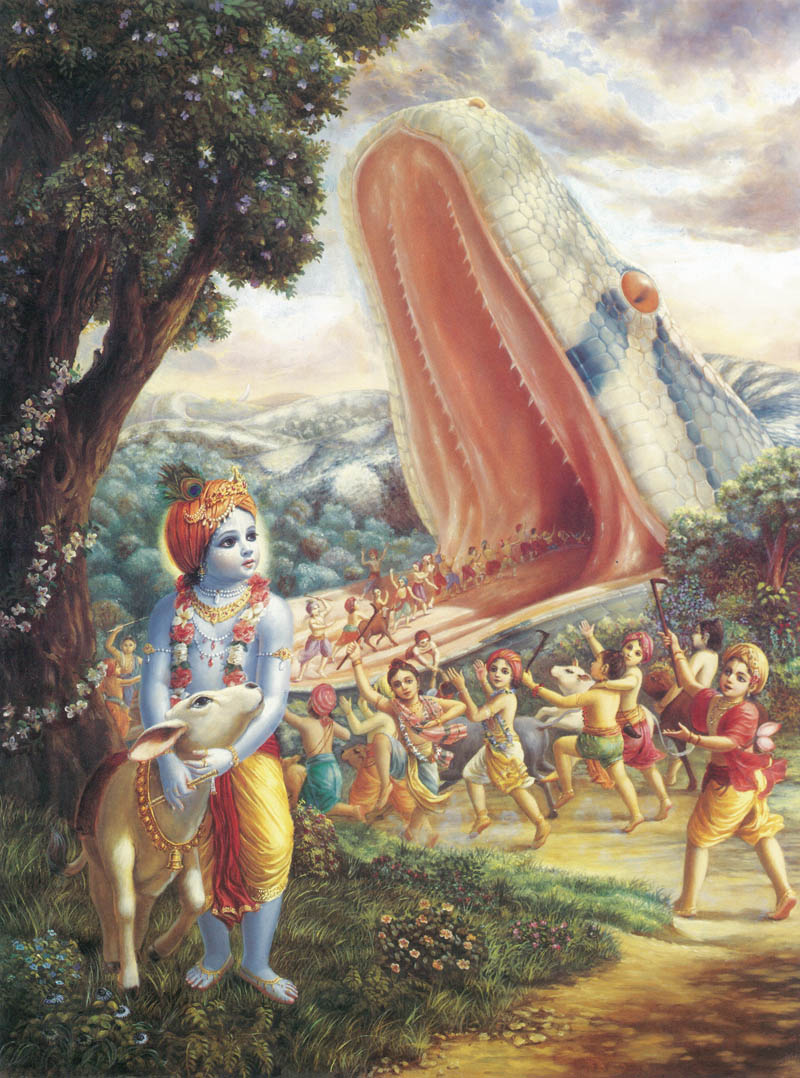 with the demon’s bones and skin. There was no bad odour coming from the demon’s body, and all the sakhās thought, “How has it become dried out like this?” Because Kṛṣṇa had assumed the forms of those cowherd boys for one year immediately after the killing of Aghāsura, they thought that only one day had elapsed since the demon was slain. Brahmā had hidden them in a cave for one year under mystic trance, but when Kṛṣṇa glanced at them they were revived, and the expanded forms of cowherd boys entered back into His original form. When Kṛṣṇa killed Aghāsura, the effulgence of the demon’s soul merged into Kṛṣṇa’s feet. Brahmā and many yogīs were watching this and thought, “Who is this? He appears to be an ordinary young boy, so how is this possible?”
with the demon’s bones and skin. There was no bad odour coming from the demon’s body, and all the sakhās thought, “How has it become dried out like this?” Because Kṛṣṇa had assumed the forms of those cowherd boys for one year immediately after the killing of Aghāsura, they thought that only one day had elapsed since the demon was slain. Brahmā had hidden them in a cave for one year under mystic trance, but when Kṛṣṇa glanced at them they were revived, and the expanded forms of cowherd boys entered back into His original form. When Kṛṣṇa killed Aghāsura, the effulgence of the demon’s soul merged into Kṛṣṇa’s feet. Brahmā and many yogīs were watching this and thought, “Who is this? He appears to be an ordinary young boy, so how is this possible?”
This verse says satām, which means saints who are always fixed in meditation. For them Kṛṣṇa is the personification of the joy derived from immersion in the impersonal Brahman, and for devotees who consider themselves His servants, He is para-daivatena – the supreme god. When Kṛṣṇa entered the wrestling arena of Kaṁsa, who saw Him as the para-devatā? The Vṛṣṇis considered Him to be their worshipful deity, but the gopīs and other residents of Vraja didn’t see Him like that. Some saw Him as a friend, some as a son and some as a paramour. Māyāśritānāṁ nara-dārakeṇa – and those under the influence of māyā saw Him as an ordinary young boy. The cowherd boys were playing with Him because kṛta-puṇya-puñjāḥ – by their “accumulation of pious activities”, they were able to enjoy with Him in this way.
There are three meanings of the word puṇya. First it can mean conventional pious activities, but the performance of this type of puṇya does not qualify one to meet Kṛṣṇa. Secondly it can mean sukṛti, and by the accumulation of this one receives sādhu-saṅga, then they may accept the shelter of a spiritual master, and then develop bhakti. And when bhakti becomes perfected, prema comes, and when one has this prema, then he can meet Kṛṣṇa. By the puṇya of personalities like Mahārāja Hariścandra, Dadhīci Ṛṣi or Mahārāja Śibi*, can one meet Bhagavān? No. By the practice of sādhana-bhakti one won’t meet Bhagavān, and even by possessing bhāva-bhakti one won’t meet Him. When one has prema-bhakti, then he can meet Kṛṣṇa. Don’t consider all types of bhakti to be one and the same. The cultivation of sādhana-bhakti will gradually elevate one, by bhāva-bhakti one may receive some darśana of Kṛṣṇa, but only prema-bhakti can overpower Him. To become Kṛṣṇa’s friend and live with Him may not even be accomplished by having prema-bhakti if one does not have the bhāva of Vraja. These sakhās possessed this prema-bhakti with vraja-bhāva, and that is the meaning of kṛta-puṇya-puñjāḥ.
Sanātana Gosvāmī describes how the sakhās would play together with great intimacy. Sometimes they would 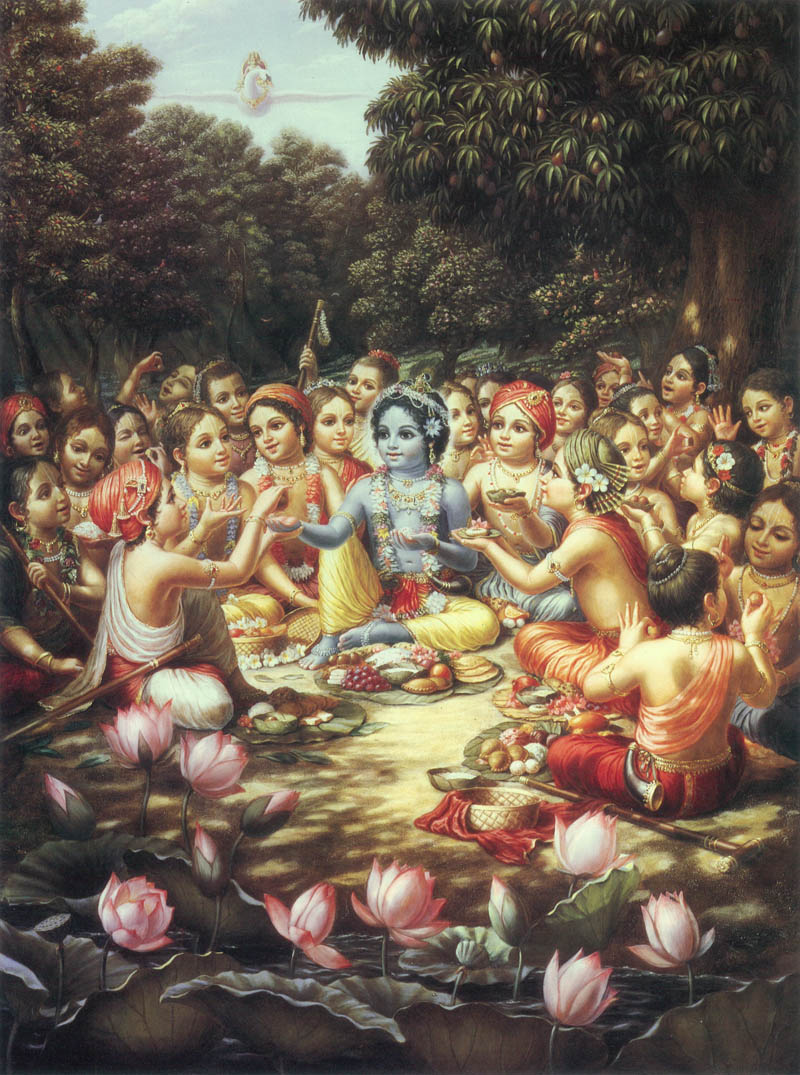 run and play with Kṛṣṇa without any clothing. They would eat from each other’s plates and place food in each other’s mouths, and they had no fear of reprimand from their elders or anyone. Speaking this verse, Śukadeva Gosvāmī felt great ānanda, though he could not remain solely on this topic for long. He is the parrot of Rādhikā, and there is nothing that can fully immerse him in ānanda which doesn’t include Her name. But here he became spellbound in sakhya-rasa, and that bhāva poured forth from his heart in the form of his words. In this verse he has used the word satām, which means “saint”, and here it refers to those who view Kṛṣṇa as the personification of brahmānanda, the bliss derived from immersion in the impersonal Brahman. It refers to those who are adorned with the twenty-six qualities of a devotee and who are jñāni-bhaktas like the four Kumāras. But if Rūpa and Sanātana Gosvāmīs had personally described a saint by their own definition, they would have referred to those who have the bhāva of Vraja, and amongst them those who possess the bhāva of the gopīs, and out of them the one who possesses the bhāva of being a maidservant of Śrīmatī Rādhikā.
run and play with Kṛṣṇa without any clothing. They would eat from each other’s plates and place food in each other’s mouths, and they had no fear of reprimand from their elders or anyone. Speaking this verse, Śukadeva Gosvāmī felt great ānanda, though he could not remain solely on this topic for long. He is the parrot of Rādhikā, and there is nothing that can fully immerse him in ānanda which doesn’t include Her name. But here he became spellbound in sakhya-rasa, and that bhāva poured forth from his heart in the form of his words. In this verse he has used the word satām, which means “saint”, and here it refers to those who view Kṛṣṇa as the personification of brahmānanda, the bliss derived from immersion in the impersonal Brahman. It refers to those who are adorned with the twenty-six qualities of a devotee and who are jñāni-bhaktas like the four Kumāras. But if Rūpa and Sanātana Gosvāmīs had personally described a saint by their own definition, they would have referred to those who have the bhāva of Vraja, and amongst them those who possess the bhāva of the gopīs, and out of them the one who possesses the bhāva of being a maidservant of Śrīmatī Rādhikā.
Once, Durvāsā Muni came and saw Kṛṣṇa playing with His friends. The boys were putting dust on top of Kṛṣṇa’s head, and Kṛṣṇa was chasing them and throwing dust on them also. They were sometimes embracing one another, sometimes singing and sometimes verbally abusing one another as children do. Durvāsā thought, “What is this? He who is the very embodiment of Brahman has taken birth in the house of Nanda?” Gazing in Kṛṣṇa’s direction, he became spellbound and just stood motionlessly. Kṛṣṇa saw him from a distance, and at once left His playing and approached him, saying, “Bābā, I have defeated Subala!” Then Subala came and said, “I have defeated Kanhaiyā!” Another boy came and said, “I defeated Kṛṣṇa!” and then Kṛṣṇa said, “No Bābā, I defeated him!” Durvāsā could only silently gaze at Kṛṣṇa, and then he sat down. He couldn’t determine who defeated whom and was unable to give them a verdict. Then Kṛṣṇa sat in his lap, and grabbing his beard, said, “Bābā, you don’t speak? Are you deaf and dumb?” Then, feeling restless, Kṛṣṇa raced away from there smiling and began playing again.
Durvāsā had not entered Vraja after only one or two days’ journey; he had been wandering for millions of years and had seen countless universes, countless Brahmās and Śaṅkaras – and after that he entered Vraja. Wonderstruck, he thought, “Here, playing with these boys, is the personification of brahmānanda?” From a distance he offered obeisances so as not to disturb Kṛṣṇa’s pastimes, and then he went away from there. This is the vision of Kṛṣṇa being referred to in this verse by the line itthaṁ satāṁ brahma-sukhānubhūtyā.
Then the next line refers to devotees who see Kṛṣṇa as para-devatā, their supremely worshipful deity. And then the third line says māyāśritānāṁ nara-dārakeṇa, which means that those under the influence of māyā see Kṛṣṇa as an ordinary child. But one more meaning has been given here: if this were to refer to those souls trapped in material illusion, then the sequence would be inconsistent. First was described how the sages see Kṛṣṇa, and then how the devotees see Him, so here māyāśritānām must refer to those who are under the influence of Yogamāyā. Sanātana Gosvāmī quotes this verse:
kātyāyani mahā-māye
mahā-yoginy adhīśvari
nanda-gopa-sutaṁ devi
patiṁ me kuru te namaḥ
Śrīmad-Bhāgavatam (10.22.4)
O Kātyāyanī, O possessor of the Yogamāyā potency, please give us the boon of having Kṛṣṇa as our husband.
So in the verse we are discussing, nara means that those who have taken shelter of Yogamāyā saw the son of 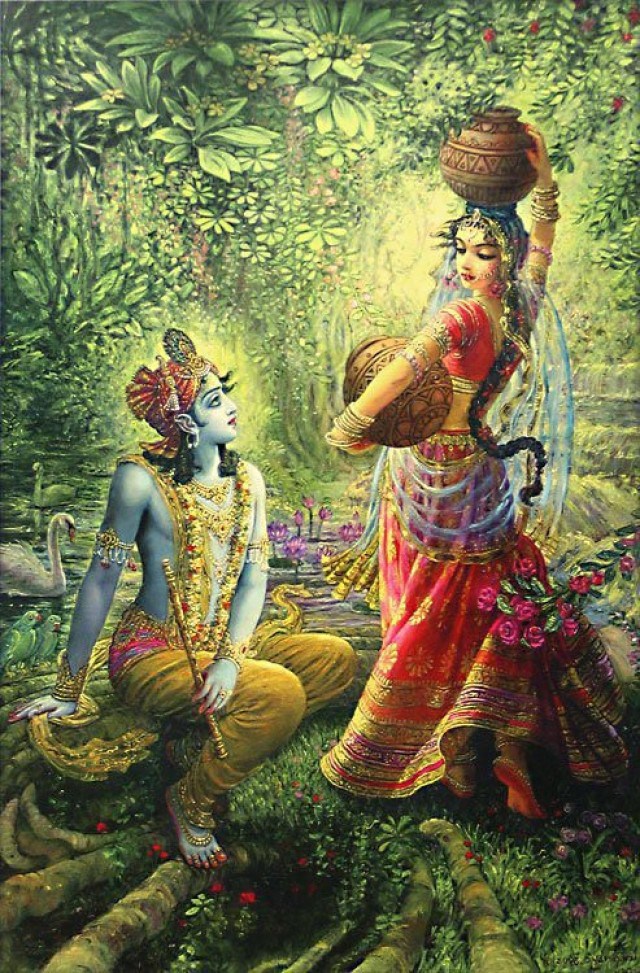 Nanda Mahārāja as an ordinary boy. They didn’t see Him with aiśvarya-bhāva, awe and reverence, but with mādhurya-bhāva, loving friendship. They always played with Him in nara-līlā, His pastimes in human form, never considering Him to be the Supreme Lord. If Kṛṣṇa ever tried to tell them that He was Bhagavān, the gopīs would start clapping and say, “What, You are Bhagavān? You are only a liar and a cheat, and when You are hungry You break Your mother’s pots of yoghurt!” So here, māyāśritānām must refer to the gopīs who by reciting this siddha-mantra and offering pūjā to Kātyāyanī received Kṛṣṇa as their paramour. Otherwise the sequence of the verse would be incorrect. And in the words nara-dārakeṇa, the word dāra can also mean “wife”, so in this way it also refers to the gopīs, who always saw Kṛṣṇa as an adolescent (kiśora), handsomely decorated like a new bridegroom, and appearing supremely attractive as the king of dancers. This verse is saying that with this dearest paramour of the gopīs, the sakhās are playing all day long, so how fortunate must they be considered to be?
Nanda Mahārāja as an ordinary boy. They didn’t see Him with aiśvarya-bhāva, awe and reverence, but with mādhurya-bhāva, loving friendship. They always played with Him in nara-līlā, His pastimes in human form, never considering Him to be the Supreme Lord. If Kṛṣṇa ever tried to tell them that He was Bhagavān, the gopīs would start clapping and say, “What, You are Bhagavān? You are only a liar and a cheat, and when You are hungry You break Your mother’s pots of yoghurt!” So here, māyāśritānām must refer to the gopīs who by reciting this siddha-mantra and offering pūjā to Kātyāyanī received Kṛṣṇa as their paramour. Otherwise the sequence of the verse would be incorrect. And in the words nara-dārakeṇa, the word dāra can also mean “wife”, so in this way it also refers to the gopīs, who always saw Kṛṣṇa as an adolescent (kiśora), handsomely decorated like a new bridegroom, and appearing supremely attractive as the king of dancers. This verse is saying that with this dearest paramour of the gopīs, the sakhās are playing all day long, so how fortunate must they be considered to be?
* The story of Mahārāja Hariścandra is found in Śrīmad-Bhāgavatam, Ninth Canto, Chapter 7. A description of Dadhīci Ṛṣi is found in Śrīmad-Bhāgavatam, Sixth Canto, Chapters 6–7, and a description of Mahārāja Śibi is found in the purport to Śrīmad-Bhāgavatam (1.12.20).
Source: Purebhakti.com
Image/Art made possible by Pixabay.com, Krishnapath.org and/or Bhaktiart.net
Unless indicated differently, all verse translations and quotes are from the books by Śrīla Bhaktivedānta Svāmī Mahārāja Prabhupāda (Vedabase.com)
